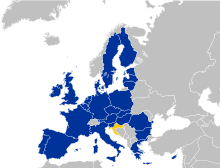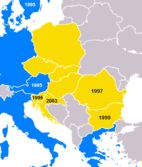
A | B | C | D | E | F | G | H | CH | I | J | K | L | M | N | O | P | Q | R | S | T | U | V | W | X | Y | Z | 0 | 1 | 2 | 3 | 4 | 5 | 6 | 7 | 8 | 9
 |
|---|
The foreign relations of Croatia is primarily formulated and executed via its government which guides the state's interactions with other nations, their citizens, and foreign organizations. Active in global affairs since the 9th century, modern Croatian diplomacy is considered to have formed following their independence from Yugoslavia in 1991. As an independent state, Croatia established diplomatic relations with most world nations – 187 states in total – during the 1990s, starting with Germany (1991) and ending most recently with Togo (2023). Croatia has friendly relations with most of its neighboring countries, namely Slovenia, Hungary, Montenegro, and Italy. They maintain colder, more tense relations with Serbia as well as Bosnia and Herzegovina due to historic nation-building conflict and differing political ideologies.
Croatia is seen as a stabilizing influence in Southeast Europe due to its political alignment with the Western world. It maintains strong relations with the United States, the United Kingdom, and the European Union (E.U.), joining the organization in 2013. Croatia is a military ally to the U.S., U.K., and E.U. through its membership in NATO, having joined in 2009. The economy of Croatia is one of the largest in Southeast Europe with $80.1 billion in nominal gross domestic product (GDP) forecasted by the IMF in 2023. The country receives foreign aid from the IMF and USAID.
Their foreign policy objectives have shifted since the Croatian War of Independence. During the 1990s, Croatia sought to gain international recognition and join the United Nations (2000), later seeking entry into NATO (2009) and the European Union (2013). Modern policy objectives are regional stabilization, influence in international organizations, and strengthening multilateral cooperation. Succession issues following the 1991-92 dissolution of Yugoslavia continue to complicate regional relations. Croatia has outstanding border disputes, sovereign ownership issues, and treaty disagreements with multiple neighbors.
Croatia is a member of the United Nations (UN), the Council of Europe, the World Trade Organization (WTO), Union for the Mediterranean and a number of other international organizations. The Council of Europe has been led by Croatian diplomat Marija Pejčinović Burić since 2019.
History

The first native Croatian ruler recognised by the Pope was duke Branimir, who received papal recognition from Pope John VIII on 7 June 879.[1] Tomislav was the first king of Croatia, noted as such in a letter of Pope John X in 925. Maritime Republic of Ragusa (1358-1808) maintained widespread diplomatic relations with the Ottoman Empire, Republic of Venice, Papal States and other states. Diplomatic relations of the Republic of Ragusa are often perceived as a historical inspiration for the contemporary Croatian diplomacy.[2] During the Wars of the Holy League Ragusa avoided alignment with either side in the conflict rejecting Venetian calls to join the Holy League.[2]
Antun Mihanović, author of the anthem of Croatia, spent over 20 years as a consul of the Austrian Empire in Belgrade (Principality of Serbia), Bucharest (Wallachia) and Istanbul (Ottoman Empire) starting in 1836.[3] The Yugoslav Committee, political interest group formed by South Slavs from Austria-Hungary during World War I, petitioned Allies of World War I and participated in international events such as the Congress of Oppressed Nationalities of the Austro-Hungarian Empire. The Association for the Promotion of the League of Nations Values was active in Zagreb in the interwar period organizing lectures by Albert Thomas, Goldsworthy Lowes Dickinson and Ludwig Quidde.[4] During World War II, the Axis puppet state known as the Independent State of Croatia maintained diplomatic relations with several different countries in Europe.
Socialist Republic of Croatia within Yugoslavia

While each constitution of Yugoslavia defined foreign affairs as a federal level issue, over the years Yugoslav constituent republics played increasingly prominent role in either defining this policy or pursuing their own initiatives. Number of diplomats from Croatia gained significant experience in the service to the prominent Cold War era Yugoslav diplomacy.[5]
In June 1943 Vladimir Velebit became the point of contact for foreign military missions in their dealings with the Yugoslav Partisans. Ivan Šubašić (1944-1945), Josip Smodlaka (NKOJ: 1943–1945), Josip Vrhovec (1978-1982) and Budimir Lončar (1987-1991) led the federal level Ministry of Foreign Affairs while numerous Croatian diplomats served in Yugoslav embassies or multilateral organizations. In 1956 Brijuni archipelago in People's Republic of Croatia hosted the Brioni Meeting, one of the major early initiatives leading to the establishment of the Non-Aligned Movement.[6][7] Between 1960 and 1967 Vladimir Velebit was executive secretary of the United Nations Economic Commission for Europe. During the Croatian Spring Croatian economist Hrvoje Šošić argued for the separate admission of the Socialist Republic of Croatia into the United Nations similar to the membership of Ukrainian and Byelorussian Soviet Socialist Republic which led to his imprisonment.[8] In 1978, Croatia together with SR Slovenia joined the newly established Alps-Adriatic Working Group. The breakup of Yugoslavia led to mass transfers of experts from federal institutions enabling post-Yugoslav states to establish their own diplomatic bodies primarily by employing former Yugoslav cadres.[9] The 2001 Agreement on Succession Issues of the Former Socialist Federal Republic of Yugoslavia formally assigned to Croatia a portion of the diplomatic and consular properties of the previous federation.[10]
Foreign policy since independence

On 17 December 1991 the European Economic Community adopted the "Common Position for the recognition of the Yugoslav Republics" requesting the Yugoslav republics wishing to gain recognition to accept provisions of international law protecting human rights as well as national minorities rights in hope that credible guarantees may prevent incentives for violent confrontations.[11][12] Later that month Croatian Parliament introduced the Constitutional Act on the Rights of National Minorities in the Republic of Croatia opening the way for 15 January 1992 collective recognition by the Community. Croatia maintained some links beyond the Euro-Atlantic world via its observer status in the Non-Aligned Movement which it enjoyed already at the 10th Summit of the Non-Aligned Movement in Jakarta, Indonesia.[13]
Following the international recognition of Croatia in 1992 the country was faced with the Croatian War of Independence between 1992 and 1995. A significant part of the country was outside of the control of the central government with the declaration of self-proclaimed unrecognized Republic of Serbian Krajina. In 1992 signing of the Sarajevo Agreement led to the cease-fire to allow UNPROFOR deployment in the country. Diplomatic efforts led to unsuccessful proposals which included the Daruvar Agreement and Z-4 Plan. In 1995 UNCRO mission took over the UNPROFOR mandate yet soon after Operation Storm led to a decisive victory for the Croatian Army with only the Eastern Slavonia, Baranja and Western Syrmia remaining initially as a rump territory of Krajina. A diplomatic solution that avoided conflict in Eastern Slavonia was reached on 12 November 1995 via the signing of the Erdut Agreement with significant support and facilitation from the international community (primarily the United States, and with United Nations and various European actors).[14][15] Temporary UNTAES administration over the region opened the way for the signing of the Dayton Agreement which ended the Bosnian War. It also led to the signing of 1996 Agreement on Normalization of Relations between the Federal Republic of Yugoslavia and the Republic of Croatia.[16]
With the resolution of some of the major bilateral issues arising from the Yugoslav Wars Croatian foreign policy has focused on greater Euro-Atlantic integration, mainly entering the European Union and NATO. The progress was nevertheless slow in the period between 1996 and 1999 with rising concerns over authoritarian tendencies in the country. In order to gain access to European and trans-Atlantic institutions, it has had to undo many negative effects of the breakup of Yugoslavia and the war that ensued, and improve and maintain good relations with its neighbours. Croatia has had an uneven record in these areas between 1996 and 1999 during the right-wing HDZ government, inhibiting its relations with the European Union and the United States. In 1997 United States diplomacy even called upon its European partners to suspend Croatia from the Council of Europe as long as country fails to show adequate respect for human and minority rights.[17] Lack of improvement in these areas severely hindered the advance of Croatia's prospects for further Euro-Atlantic integration. Progress in the areas of Dayton, Erdut, and refugee returns were evident in 1998, but progress was slow and required intensive international engagement. Croatia's unsatisfactory performance implementing broader democratic reforms in 1998 raised questions about the ruling party's commitment to basic democratic principles and norms. Areas of concern included restrictions on freedom of speech, one-party control of public TV and radio, repression of independent media, unfair electoral regulations, a judiciary that is not fully independent, and lack of human and civil rights protection.
With the 1999 death of President Franjo Tuđman, 2000 Croatian parliamentary election as well as corresponding regional changes such as the Overthrow of Slobodan Milošević, the European Union organized the 2000 Zagreb and 2003 Thessaloniki Summits in which European integration perspective was discussed for all the countries in the region.[18] The new SDP-led centre-left coalition government slowly relinquished control over public media companies and did not interfere with freedom of speech and independent media, though it did not complete the process of making Croatian Radiotelevision independent. Judiciary reforms remained a pending issue as well. The government's foreign relations were severely affected by the hesitance and stalling of the extradition of Croatian general Janko Bobetko to the International Criminal Tribunal for the Former Yugoslavia (ICTY), and inability to take general Ante Gotovina into custody for questioning by the Court. Nevertheless, Croatia managed to enter NATO's Partnership for Peace Programme in May 2000, World Trade Organization in July 2000, signing a Stabilization and Association Agreement with the EU in October 2001, Membership Action Plan in May 2002, and joined the Central European Free Trade Agreement (CEFTA) in December 2002. The EU membership application was the last major international undertaking of the Račan government, which submitted a 7,000-page report in reply to the questionnaire by the European Commission. Negotiations were initiated with the achievement of the full cooperation with the Hague Tribunal in October 2005. Croatian president Stjepan Mesić participated in the NAM conferences in Havana in 2006 and Sharm el-Sheikh in 2009 using the country's post-Yugoslav link with the Third World in its successful campaign for the Eastern European Spot at the United Nations Security Council in 2008–2009 (in open competition with Czech Republic which was a member state both of EU and NATO).[19][20]
Refugee returns accelerated since 1999, reached a peak in 2000, but then slightly decreased in 2001 and 2002. The OSCE Mission to Croatia, focusing on the governed by the UNTAES, continued to monitor human rights and the return of refugees until December 2007 with the OSCE office in Zagreb finally closing in 2012.[21][22] Croatian Serbs continue to have problems with restitution of property and acceptance to the reconstruction assistance programmes. Combined with lacking economic opportunities in the rural areas of former Krajina, the return process was only partial.
Accession to the European Union

At the time of Croatia's application to the European Union, three EU members states were yet to ratify the Stabilization and Association Agreement: United Kingdom, the Netherlands and Italy. The new Sanader government elected in 2003 elections repeated the assurances that Croatia will fulfill the missing political obligations, and expedited the extradition of several ICTY inductees. The European Commission replied to the answers of the questionnaire sent to Croatia on 20 April 2004 with a positive opinion. The country was finally accepted as EU candidate in July 2004. Italy and United Kingdom ratified the Stabilization and Association Agreement shortly thereafter, while the ten EU member states that were admitted to membership that year ratified it all together at a 2004 European Summit. In December 2004, the EU leaders announced that accession negotiations with Croatia would start on 17 March 2005 provided that Croatian government cooperates fully with the ICTY. The main issue, the flight of general Gotovina, however, remained unsolved and despite the agreement on an accession negotiation framework, the negotiations did not begin in March 2005. On 4 October 2005 Croatia finally received green light for accession negotiations after the Chief Prosecutor of the ICTY Carla Del Ponte officially stated that Croatia is fully cooperating with the Tribunal. This has been the main condition demanded by EU foreign ministers for accession negotiations. The ICTY called upon other southern European states to follow Croatia's good example. Thanks to the consistent position of Austria during the meeting of EU foreign ministers, a long period of instability and the questioning of the determination of the Croatian government to extradite alleged war criminals has ended successfully. Croatian Prime minister Ivo Sanader declared that full cooperation with the Hague Tribunal will continue. The accession process was also complicated by the insistence of Slovenia, an EU member state, that the two countries' border issues be dealt with prior to Croatia's accession to the EU.
Croatia finished accession negotiations on 30 June 2011, and on 9 December 2011, signed the Treaty of Accession.[23] A referendum on EU accession was held in Croatia on 22 January 2012, with 66% of participants voting in favour of joining the Union.[24][25][26][27] The ratification process was concluded on 21 June 2013, and entry into force and accession of Croatia to the EU took place on 1 July 2013.[28]
Current events
The main objective of the Croatian foreign policy is positioning within the EU institutions and in the region, cooperation with NATO partners and strengthening multilateral and bilateral cooperation.[29]
Government officials in charge of foreign policy include the Minister of Foreign and European Affairs, currently Gordan Grlić-Radman, and the President of the Republic, currently Zoran Milanović.
Croatia has established diplomatic relations with 186 countries around the world. As of 2009, Croatia maintains a network of 51 embassies, 24 consulates and eight permanent diplomatic missions abroad. Furthermore, there are 52 foreign embassies and 69 consulates in the Republic of Croatia in addition to offices of international organizations such as the European Bank for Reconstruction and Development, International Organization for Migration, Organization for Security and Co-operation in Europe (OSCE), World Bank, World Health Organization, International Criminal Tribunal for the former Yugoslavia (ICTY), United Nations Development Programme, United Nations High Commissioner for Refugees and UNICEF.[30]
International organizations
Republic of Croatia participates in the following international organizations: CE, CEI, EAPC, EBRD, ECE, EU, FAO, G11, IADB, IAEA, IBRD, ICAO, ICC, ICRM, IDA, IFAD, IFC, IFRCS, IHO, ILO, IMF, IMO, Inmarsat, Intelsat, Interpol, IOC, IOM, ISO, ITU, ITUC, NAM (observer[31][32]), NATO, OAS (observer), OPCW, OSCE, PCA, PFP, SECI, UN, UNAMSIL, UNCTAD, UNESCO, UNIDO, UNMEE, UNMOGIP, UPU, WCO, WEU (associate), WHO, WIPO, WMO, WToO, WTO
There exists a Permanent Representative of Croatia to the United Nations.
Foreign support
Croatia receives support from donor programs of:
- European Bank for Reconstruction and Development (EBRD)
- European Union
- International Bank for Reconstruction and Development
- International Monetary Fund
- USAID
Between 1991 and 2003, the EBRD had directly invested a total of 1,212,039,000 EUR into projects in Croatia.
In 1998, U.S. support to Croatia came through the Southeastern European Economic Development Program (SEED), whose funding in Croatia totaled $23.25 million. More than half of that money was used to fund programs encouraging sustainable returns of refugees and displaced persons. About one-third of the assistance was used for democratization efforts, and another 5% funded financial sector restructuring.
In 2003 USAID considered Croatia to be on a "glide path for graduation" along with Bulgaria. Its 2002/2003/2004 funding includes around $10 million for economic development, up to $5 million for the development of democratic institutions, about $5 million for the return of population affected by war and between 2 and 3 million dollars for the "mitigation of adverse social conditions and trends". A rising amount of funding is given to cross-cutting programs in anti-corruption, slightly under one million dollars.
The European Commission has proposed to assist Croatia's efforts to join the European Union with 245 million euros from PHARE, ISPA and SAPARD aid programs over the course of 2005 and 2006.
International disputes
Relations with neighbouring states have normalized somewhat since the breakup of Yugoslavia. Work has begun — bilaterally and within the Stability Pact for South Eastern Europe since 1999 — on political and economic cooperation in the region.
Bosnia and Herzegovina

Discussions continue between Croatia and Bosnia and Herzegovina on various sections of the border, the longest border with another country for each of these countries. Sections of the Una river and villages at the base of Mount Plješevica are in Croatia, while some are in Bosnia, which causes an excessive number of border crossings on a single route and impedes any serious development in the region. The Zagreb-Bihać-Split railway line is still closed for major traffic due to this issue. The border on the Una river between Hrvatska Kostajnica on the northern, Croatian side of the river, and Bosanska Kostajnica on the southern, Bosnian side, is also being discussed. A river island between the two towns is under Croatian control, but is also claimed by Bosnia. A shared border crossing point has been built and has been functioning since 2003, and is used without hindrance by either party.
The Herzegovinian municipality of Neum in the south makes the southernmost part of Croatia an exclave and the two countries are negotiating special transit rules through Neum to compensate for that. Recently Croatia has opted to build a bridge to the Pelješac peninsula to connect the Croatian mainland with the exclave but Bosnia and Herzegovina has protested that the bridge will close its access to international waters (although Croatian territory and territorial waters surround Bosnian-Herzegovinian territory and waters completely) and has suggested that the bridge must be higher than 55 meters for free passage of all types of ships. Negotiations are still being held.
Italy
The relations between Croatia and Italy have been largely cordial and friendly. Occasional incidents do arise on issues such as the Istrian–Dalmatian exodus or the Ecological and Fisheries Protection Zone.
Montenegro
Croatia and Montenegro have a largely latent border dispute over the Prevlaka peninsula, and maintain friendly relations.
Serbia
The border between Croatia and Serbia in the area of the Danube is disputed while at the same time the issue is not considered of the highest priority for either country in their bilateral relations.[33] The issue therefore only occasionally entered into in the public debate with other open issues being higher on the agenda, yet with some commentators fearing that the issue may once be used as an asymmetric pressure tool in the accession of Serbia to the European Union.[34][35] While Serbia holds the opinion that the thalweg of the Danube valley and the centerline of the river represents the international border between the two countries, Croatia disagrees and claims that the international border lies along the boundaries of the cadastral municipalities located along the river—departing from the course at several points along a 140-kilometre (87 mi) section.[35] The cadastre-based boundary reflects the course of the Danube which existed in the 19th century, before meandering and hydrotechnical engineering works altered its course. The area size of the territory in dispute is reported variously, up to 140 square kilometres (54 square miles) and is uninhabited area of forests and islands.[35] Croatian and Serbian authorities have made only occasional attempts to resolve the issue with the establishment of a joint commission that rarely met and the 2018 statement by presidents of the two countries that the issue will be brought to international arbitration if agreement is not reached until 2020.[35]
Slovenia
Croatia and Slovenia have several land and maritime boundary disputes, mainly in the Gulf of Piran, regarding Slovenian access to international waters, a small number of pockets of land on the right-hand side of the river Dragonja, and around the Sveta Gera peak. The two states contested the sovereign ownership of Yugoslav bank Ljubljanska banka, which ended in Slovenia's favor. The status of Croatian depositors' savings in the bank remains an outstanding issue. Slovenia was disputing Croatia's claim to establish the Ecological and Fisheries Protection Zone, an economic section of the Adriatic.
Diplomatic relations
List of countries which Croatia maintains diplomatic relations with:

| ||
|---|---|---|
| # | Country | Date[36] |
| 1 | 15 January 1992 | |
| 2 | 15 January 1992 | |
| 3 | 17 January 1992 | |
| 4 | 18 January 1992 | |
| 5 | 29 January 1992 | |
| 6 | 30 January 1992 | |
| 7 | 1 February 1992 | |
| 8 | 3 February 1992 | |
| 9 | 4 February 1992 | |
| 10 | 6 February 1992 | |
| – | 8 February 1992 | |
| 11 | 11 February 1992 | |
| 12 | 13 February 1992 | |
| 13 | 14 February 1992 | |
| 14 | 18 February 1992 | |
| 15 | 19 February 1992 | |
| 16 | 20 February 1992 | |
| 17 | 25 February 1992 | |
| 18 | 2 March 1992 | |
| 19 | 9 March 1992 | |
| 20 | 10 March 1992 | |
| 21 | 13 March 1992 | |
| 22 | 18 March 1992 | |
| 23 | 30 March 1992 | |
| 24 | 11 April 1992 | |
| 25 | 13 April 1992 | |
| 26 | 15 April 1992 | |
| 27 | 18 April 1992 | |
| 28 | 24 April 1992 | |
| 29 | 29 April 1992 | |
| 30 | 4 May 1992 | |
| 31 | 11 May 1992[37] | |
| 32 | 13 May 1992 | |
| 33 | 25 May 1992 | |
| 34 | 23 June 1992 | |
| 35 | 24 June 1992 | |
| 36 | 26 June 1992 | |
| 37 | 30 June 1992 | |
| 38 | 30 June 1992 | |
| 39 | 9 July 1992 | |
| 40 | 17 July 1992 | |
| 41 | 20 July 1992 | |
| 42 | 20 July 1992 | |
| 43 | 21 July 1992 | |
| 44 | 11 August 1992 | |
| 45 | 13 August 1992 | |
| 46 | 25 August 1992 | |
| 47 | 26 August 1992 | |
| 48 | 29 August 1992 | |
| 49 | 3 September 1992 | |
| 50 | 9 September 1992 | |
| 51 | 23 September 1992 | |
| 52 | 25 September 1992 | |
| 53 | 1 October 1992 | |
| 54 | 15 October 1992 | |
| 55 | Zdroj:https://en.wikipedia.org?pojem=Foreign_relations_of_Croatia||





